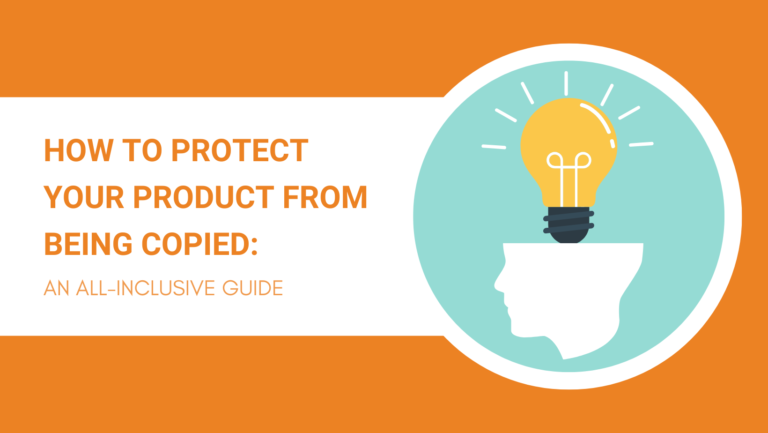Developing a product is a major stride for any entrepreneur. It allows you to bring new ideas to life, win over customers looking for better products, and possibly make better profits.
It is, nevertheless, a costly and grueling process that may have you burning the midnight oil before it finally pays off. There is also always the risk that one of your competitors may copy your idea and try to profit off of it.
This is both unfair and unethical, but, more importantly, it is a serious threat to the success of your business. It is thus crucial to guard against it.
So, if you are developing or about to launch a new product, here is an in-depth look at how to protect your product from being copied.

How to Prevent Factories from Copying Your Product Idea
When you choose to develop a product, you will likely need to find a private label manufacturer to produce it.
This is usually a lengthy process where you first need to identify suitable potential suppliers and then evaluate them to find out if they meet your manufacturing requirements.
The problem, however, is that you may need to share creative aspects of your product with potential manufacturers to find out if they can do the job.
An unscrupulous manufacturer could easily take up your idea and run with it or share it with other clients; both cases could greatly undermine your brand.
On the upside, you could prevent this by:
Playing the Long Game
Your first list of potential manufacturers may be full of options but you may soon realize that only a handful of them are eligible. Therefore, only share as little information as possible in the preliminary stages.
Try to sort through manufacturers based on factors like price, MOQ, or whether they have any experience producing the kind of products you require. This will help you cut down your list to a handful of manufacturers that you can share more details with.

The idea here is to minimize your risk; the fewer factories you share your information with, the lower your risk of encountering a copycat. Moreover, it is easier to hold 1 or 2 manufacturers accountable than 10.
Limiting Your Disclosure
Manufacturers usually request a product brief or a product specification sheet during consultations. It helps them establish whether they can meet your requirements and prepare a quote.
While it is important to provide accurate details in your brief, you can exclude key design details that make your product special.
For example, if you are launching a line of private label scented candles, you can let the manufacturer know what type of wax you prefer, but you do not have to disclose your scent formulas.
This approach makes it difficult for a manufacturer to copy your idea as they would not have enough details to execute it properly.
Considering Manufacturers’ Reputations

Ask potential manufacturers about their discretion policies. What steps can they take to protect your ideas? Are they willing to sign a non-disclosure agreement?
Further, most entrepreneurs now share their experiences with different suppliers online. It may thus be prudent to look up potential suppliers on online platforms to get a sense of their reputation. Such platforms may include:
- B2B sites e.g. Alibaba
- Review sites e.g. TrustPilot
- Social media
- E-commerce forums e.g. Shopify Community
- Professional forums e.g. LinkedIn
Working with a credible sourcing agent can also help make this step a lot easier. They:
- Have the time, skill, and access to information required to properly vet manufacturers.
- Usually know more about most manufacturers than you because of their industry networks.
- Have a better understanding of how legal intellectual property protections work in their country.
Splitting Production
Coca-Cola has managed to remain unrivaled for decades because no other brand has managed to copy the firm’s idea. This is mainly because the firm handles its production formula with the same discretion as that accorded to nuclear launch codes.
You too can replicate this for your brand by splitting your production process among different manufacturers.
Take, for example, that you are launching a line of private-label knives. You could source different components, like handle pins and fasteners, from multiple manufacturers and handle the assembly and decoration in-house.
None of the manufacturers handling the different stages would have full access to your idea because they would only be contributing to segments of it.
Insisting on Contracts

Ask potential manufacturers to sign non-disclosure agreements before disclosing any proprietary information.
Ensure that you also have a legal representative that can draw up or go through such contracts to confirm that they safeguard your interests.
Additionally, keep in mind that intellectual property laws vary between countries. For example, if you partner with a manufacturer in China, the law only recognizes a Non-disclosure, Non-use, and Non-circumvention (NNN) agreement instead of an NDA.
Seek to understand such issues or consult professionals to ensure you are fully protected.
How to Protect Your Design from Being Copied
Launching a great product may earn you the envy of fellow entrepreneurs that would like to get a slice of the profits you may be earning. Consequently, it is equally vital to protect your product design from copycats.
Consider:
Legal Protections

The law provides protective measures that you can take to protect your ideas and brand. Your legal counsel should, therefore, advise you on which of the following options you should explore.
- Patent – a patent would limit other businesses from replicating your idea/design for a specific duration.
- Copyright – copyright law limits others from copying, distributing, adapting, or displaying your design. This may be ideal if you develop creative works like graphic designs for clothing items.
- Trademark – a trademark bars others from copying or using your brand name, logo, and any other signs that customers use to identify your product. It could protect you from copycats trying to confuse your customers by copying your brand identifiers.
Strategic Marketing
Modern consumers tend to gravitate toward brands that disclose:
- What their products offer
- The beneficial ingredients used to make the products
Of course, the only way to disclose such information is through advertising, branding, or informative product reviews.
However, keep in mind that your competitors also keep tabs on your ad campaigns and product ideas. It is, therefore, wise to craft your advertising messages carefully.
Strive to offer information that can attract customers but do not over-prioritize transparency. Disclosing too much about your product’s benefits may open you up to imitation.
The skincare brand ‘Cerave’, for instance, rigorously markets its moisturizers by highlighting that they contain ceramides that help repair the skin. This is true but the brand is strategically less forthcoming about its ceramide sources and such proprietary information.
What Can You Do If Your Product Idea Is Copied?
It is never too late to fight for your idea. So, if you learn that another brand is acting in bad faith, you can:
Send a Cease and Desist Order
A cease and desist order is a legal document that advises your copycat to immediately stop replicating or using your idea without your consent.
It also outlines what part of your concept you believe they are exploiting and any further actions you plan to take against them if they do not stop.
You should, preferably, have it drawn up by a legal professional, as soon as you learn of the copying violation.
Litigation

If a copycat does not stop using your product idea, you would be well within your rights to seek redress in court.
However, litigation can be a bag of mixed fortunes.
On one hand, filing a suit may stop your copycat from exploiting your idea and deter others from doing the same. Yet, on the flip side, intellectual property litigation is costly, time-consuming, and may not go in your favor.
In a nutshell, always seek proper legal advice and choose your battles wisely.
Alternative Dispute Resolution
Most industries and consumer markets have regulatory bodies or associations that hold significant authority.
Where possible, it may be easier to report and seek redress for malpractices or acts of bad faith like copying from such an organization.
Granted, they may not have the authority of a court but most businesses take them seriously to avoid penalties or prevent being struck off the roll of such beneficial bodies.
How to Stay Ahead of the Copycats in Your Industry
We, unfortunately, can not wish copycats away. You can only guard against them or try to always stay a step ahead of them by:
Cultivating Customer Loyalty

Customers appreciate great products but they often stay loyal to a brand because of the experience it delivers. So, if you cultivate loyalty, it is unlikely that copycats will harm your brand because your customers will remain unswayed by their efforts.
Commit to:
- Efficient customer care – ensure that you have a team to handle all your customers’ questions, requests, or feedback. It makes them feel heard, valued, and appreciated which, in turn, cultivates loyalty.
- A responsive culture – hear your customers out and make changes to address their requests or complaints.
- Proper packaging – aim for attractive but user-friendly packaging that makes it easy for customers to use and show off your products.
- Giving back – reward your customers from time to time through gifts. Take up meaningful causes that matter to your customers too to show them that your brand cares for them.
Taking Advantage of Your Head Start
Copying is a long process because copycats have to first find out how to execute your product design or formula. Especially in instances where they may not have all the necessary information.
Take advantage of this head start to get your legal protections in place, cultivate customer loyalty, and solidify your market share. This way your copycats will never truly be your competitors as they will constantly be playing catch up.
Innovating

Your first product formula or design may be outstanding but consumers’ needs equally keep evolving. Your research may also reveal new ways to make your products safer or more effective.
Pay attention to such issues and keep improving your products accordingly. It will go a long way in distinguishing them from the imitations that copycats offer. Consumers will also appreciate your brand more for being responsive to their needs or new trends.
FAQs about How to Prevent Your Product from Being Copied
Is Copying a Product Legal?
Not always.
If you have a patent, copyright, trademark, or any other legal protection for your product or idea, then it is illegal for another party to copy it.
However, even then, you would have to legally demonstrate how exactly they have violated your intellectual property rights.
On the other hand, if you do not have any legal protections in place, it can be tough to seek legal redress against copycats. Their actions would undoubtedly be unethical but you may not be able to claim ownership of the idea if you did not register it.
Which Is Better, a Patent or a Trademark?
Patents and trademarks address different intellectual property rights issues.
In their elementary definitions, a patent prohibits anyone from using your idea to make a product for a limited time while a trademark protects your brand identifiers like a logo or your brand name. You, therefore, can not use a patent in place of a trademark.
Working with a competent legal representative can help you choose the right way to protect your idea.
Final Thoughts
Developing a product idea is worthwhile because it can boost the trajectory of your business to a whole new level. Still, do not go into it blindly. Invest in all the necessary precautions to ensure that unscrupulous competitors do not rob you of your rewards.
At NicheSources, we understand how tough it can be to bring an idea to fruition. Subsequently, we provide premium product development services and help our clients find forthright manufacturers to handle their projects. We also commit to infallible discretion.
Why put off executing your idea any longer? Simply send us an outline of your sourcing or product development requirements, request a free quote, and we’ll get right to work.

